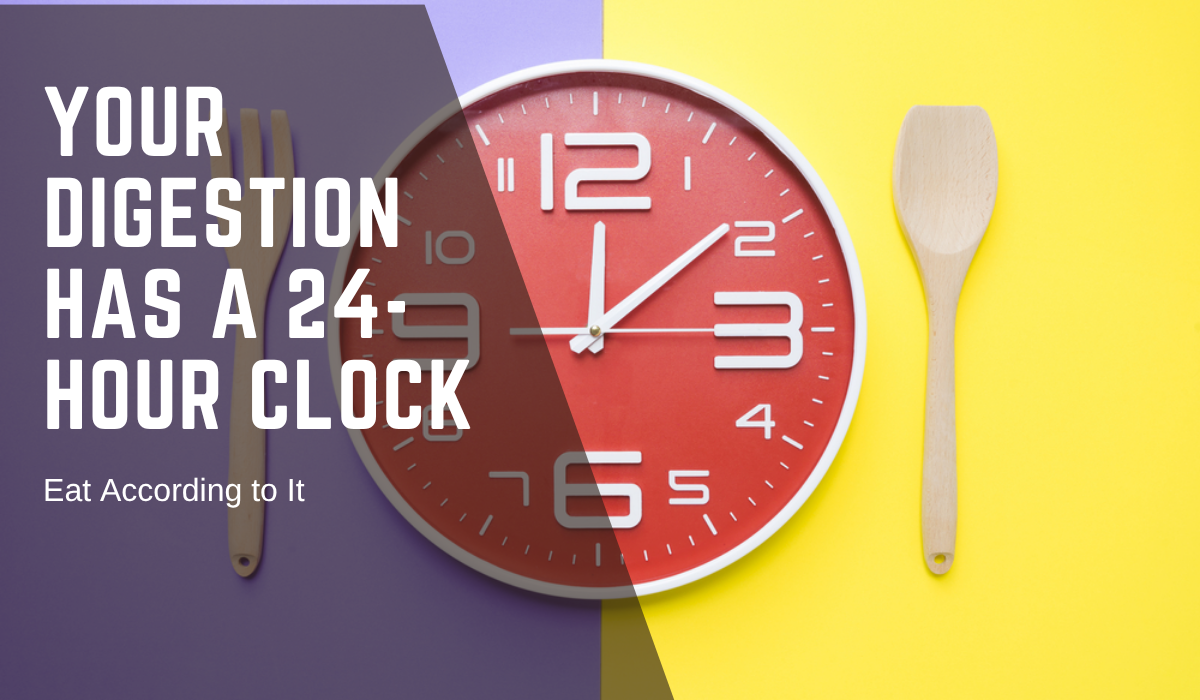Your Gut Has a Schedule — Are You Following It?
We often think about what we eat, but rarely about when we eat.
But here’s the fascinating truth — your digestion works on a 24-hour clock set by your body’s circadian rhythm.
This rhythm isn’t just about sleep and wake cycles; it influences:
How fast your stomach empties
How active your digestive enzymes are
How efficiently your gut absorbs nutrients
How your metabolism handles carbohydrates, proteins, and fats at different times of the day
Eating in sync with your body clock can:
- Improve digestion and nutrient absorption
- Keep energy steady through the day
- Reduce bloating, acidity, and heaviness after meals
- Support healthy weight management
Here’s your practical daily eating timeline based on how your digestive system naturally works.
6:30 am – 8:00 am: Wake-Up Hydration & Gentle Start
Why: Overnight, your digestive system shifts into repair mode — rebuilding gut lining cells, balancing gut bacteria, and detoxifying.
When you wake up, your stomach is not ready for a heavy breakfast right away; it needs a signal to “switch on” gently.
What to do:
-
Start with warm water or lemon water to stimulate digestion and hydration.
-
Herbal teas like ginger, fennel, or cinnamon can boost circulation and wake up your gut without overwhelming it.
Avoid: Fried, heavy, or creamy foods in the first hour — they can overload a still-sleepy digestive system.
Think of this step as stretching before a workout — you’re preparing, not pushing.
8:00 am – 10:00 am: Prime Time for a Protein-Rich Breakfast
Why: This is when digestive enzymes and stomach acid peak for the first time in the day. Your body is primed to convert food into usable energy rather than storing it as fat.
Best choices:
-
Moong chilla with mint chutney
-
Vegetable upma with added nuts/seeds
-
Quinoa poha for a protein + complex carb combo
Pro tip: Add a mix of lentils, dairy, or nuts for protein. It will keep blood sugar stable and prevent that mid-morning energy crash.
Imagine your metabolism as a campfire — breakfast is when you add the first big log to keep it burning steady all day.
12:00 pm – 1:30 pm: The ‘King Meal’ Window
Why: Between noon and early afternoon, stomach acid production is at its highest. The gut can handle heavier, more complex foods, breaking them down efficiently for nutrient absorption.
Best choices:
-
Roti with dal and sabzi
-
Millet khichdi with vegetables and ghee
-
Brown rice with rajma/chole and fresh salad
Pro tip:
-
Make lunch your heaviest meal of the day.
-
Eat slowly, chew well, and avoid screens to reduce overeating and indigestion.
This is your body’s “digestive peak hour” — give it nutrient-rich, wholesome foods.
4:00 pm – 5:00 pm: Smart Energy-Boost Snack
Why: By late afternoon, blood sugar dips naturally. Your digestive power is still active, so a small, balanced snack can prevent overeating at dinner and support evening focus.
Best choices:
-
Fruit with nuts or seeds
-
Roasted chana with masala
-
Yogurt with berries
Avoid: Packaged sugary snacks — they give a short-lived high followed by an energy crash.
Think of this as topping up your fuel tank — enough to keep going, but not so much that you’re full at dinner.
7:00 pm – 8:00 pm: Light & Early Dinner
Why: After sunset, digestive enzyme production declines. Heavy, late meals stay in the stomach longer, causing bloating, disturbed sleep, and even morning acidity.
Best choices:
-
Clear vegetable soup with whole-grain toast
-
Moong dal khichdi with vegetables
-
Steamed idlis with light sambhar
Pro tip:
-
Keep dinner light and easy to digest.
-
Aim to finish eating at least 2–3 hours before bed.
You’re fueling for rest, not for running a marathon — your dinner should reflect that.
9:00 pm onwards: Gut Rest Mode
Why: Your gut switches from digestion to deep repair — strengthening the gut lining, balancing microbiota, and clearing toxins. Late-night eating interrupts this process.
What to do:
-
Avoid snacks after dinner; sip plain water or warm herbal tea if needed.
-
Give your gut a 12–14 hour fasting window for better metabolic health.
Think of this as giving your kitchen staff the night off so they can deep-clean before the next day.
Bottom Line
Your digestion isn’t random — it’s timed. By aligning your meals with your circadian rhythm, you’re not only supporting gut health but also improving your energy, mood, and metabolism.
Try following this plan for just one week, and pay attention to:
-
Less bloating after meals
-
Steadier energy
-
Better sleep quality
-
Easier portion control
When you eat at the right time, you work with your body instead of against it — and your gut will thank you.



